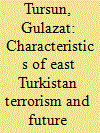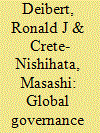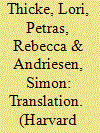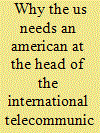| Srl | Item |
| 1 |
ID:
130634


|
|
|
| 2 |
ID:
114221


|
|
|
|
|
| Publication |
2012.
|
| Summary/Abstract |
States are moving to assert their interests more forcefully in cyberspace and associated governance regimes. Traditionally, transnational networks of engineers, based primarily in the United States and Europe, have been the primary architects of cyberspace governance, with the users and private sector shaping cyberspace itself. However, governments are becoming increasingly influential across a number of governance forums and are deliberating on how to exercise power in and through cyberspace. Particularly noteworthy are how nondemocratic states outside of Europe, North America, and parts of Asia have begun to forcefully assert their interests in cyberspace governance regimes, including some, like the International Telecommunications Union, that were previously marginalized in the Internet space. Western liberal democracies are also moving away from laissez-faire and market-oriented approaches to more state-directed controls and regulations. Drawing from international relations theory literature, and in particular constructivist approaches, this article examines international and global mechanisms and dynamics that explain the growth and spread of cyberspace controls. It also provides a study of "norm regression" in global governance: the growth and spread of practices that undercut cyberspace as an open commons of information and communication.
|
|
|
|
|
|
|
|
|
|
|
|
|
|
|
|
| 3 |
ID:
098133


|
|
|
| 4 |
ID:
119899


|
|
|
|
|
| Publication |
2012.
|
| Summary/Abstract |
Despite the Internet and the global nature of aid organizations, hundreds of millions of people still live in the information dark ages. Children die of dehydration in areas where the simple oral rehydration ingredients-water, salt, and sugar-are available, but health posters on how to use them are in a different language. Anti-retrovirals can be issued to HIV positive patients, but if the instructions on how to take them are in the wrong language, confusion about the drug regimen will lead to side effects and patients desisting with treatment. The issue is not access to treatment, but access to knowledge, and language is the barrier. Access to knowledge is the linchpin in the fight against poverty, exploitation and medical disparities, and "the language last mile" is the final hurdle to bringing knowledge to every corner of the world.
|
|
|
|
|
|
|
|
|
|
|
|
|
|
|
|
| 5 |
ID:
188491


|
|
|
|
|
| Summary/Abstract |
INFORMATION and communication technologies (ICTs) are becoming key tools of international influence for nations. Geopolitical rivalry has largely shifted to the ICT realm. A nation's level of digitalization now ranks alongside its economic, political, and military strength as a determinant of its international status.
|
|
|
|
|
|
|
|
|
|
|
|
|
|
|
|